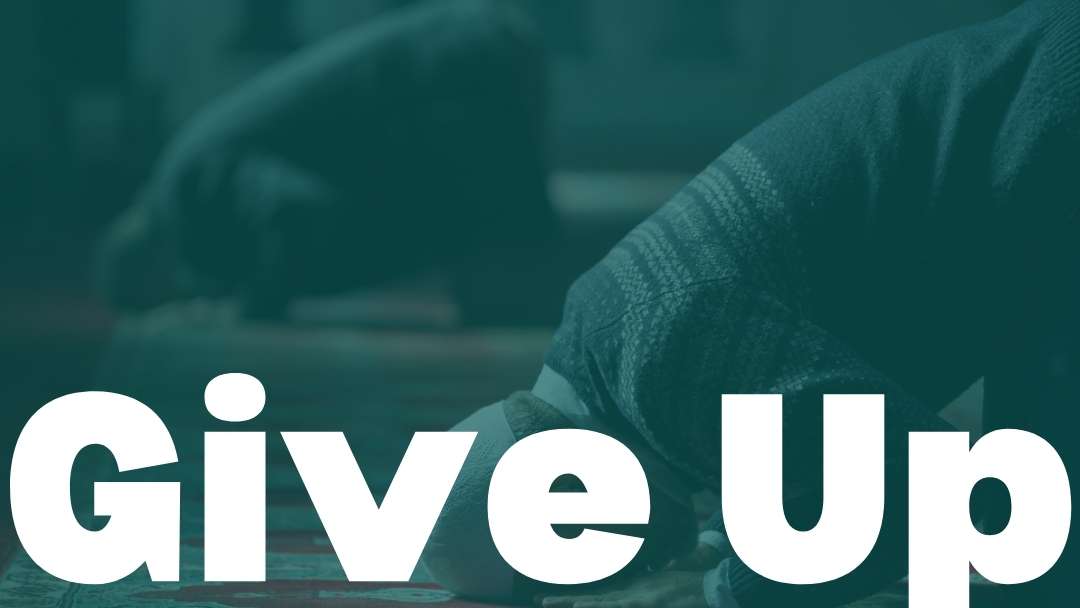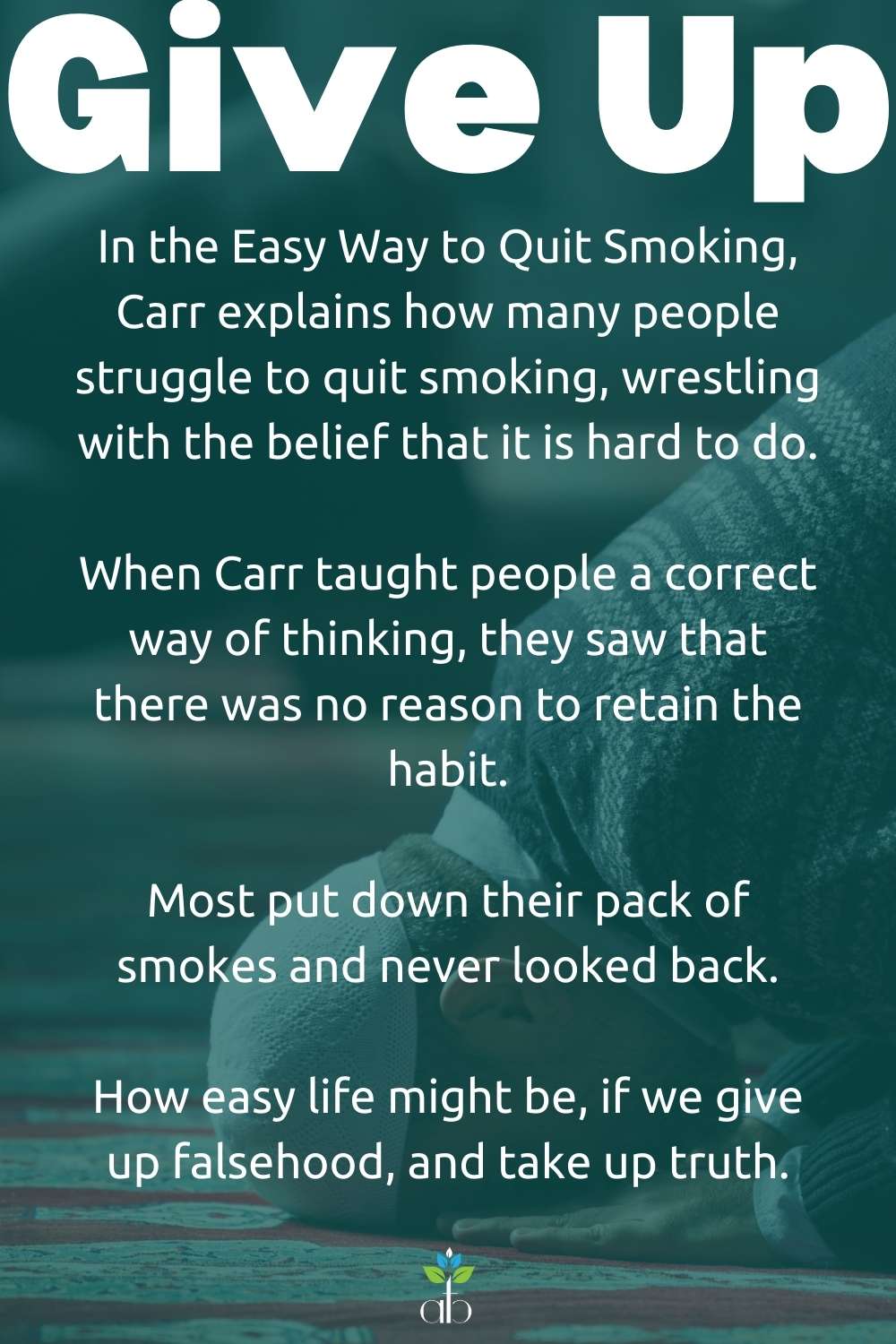Episode 466
Take Up Truth

In Allen Carr’s Easy Way to Quit Smoking, Carr and his students describe how quitting smoking can appear difficult – even being built up as a momentous task by anti-smoking campaigns. However, once one proceeds with correct understanding, the act and habit become as simple as remembering to park in a new parking space.
Many aspects of our lives are like this. We can struggle to give things up, laboring under false knowledge – and continuing to fight against it.
Or we can take up truth, and find simplicity.
Transcript
Welcome, beautiful thinkers!
Let’s talk about this idea of take up truth.
So, the other day I was reading Allen Carr’s easy way to quit smoking.
I’m not a smoker.
But I was very curious about the book.
So many people have mentioned it to me over the years.
And they say it’s the best and found the ratings on the reviews that they give of this book.
So outstanding that I wanted to read it even though I don’t have a problem with smoking.
So I was curious what greater principles might be revealed in this book.
And as it turns out, and as well, it’s just as good as they said it was, it is a kind of cognitive behavioral therapy book.
Not in the, in that tradition directly, but it’s describing how you think about things.
So it talks about these ideas like the little monster, the little monster is the physical addiction and the physical withdrawal symptoms of cigarettes or nicotine, that keep you coming back.
But the big monster is the idea that keeps you coming back, the idea that this is actually something beneficial, or even enjoyable for you.
And according to Carr, it’s not really enjoyable.
You fool yourself into thinking that smoking cigarettes or tobacco, cigars, vapes fool yourself into thinking that these things are enjoyable, but when you’re really getting is just the relief from the withdrawal symptoms.
So if you give it up, then you can feel like a nonsmoker all the time, as long as you give up those both things.
Give up the small problem, which is the physical addiction and the large problem, which is the mental addiction, or the mistaken belief.
And I wondered about this.
This is very interesting.
Most people attempt to renounce the little monster, they attempt to renounce the habit.
And there’s even that example of a fellow who is somewhat successful in giving up his nicotine addiction.
But every day, he still thinks about cigarettes.
And he says to himself, “Well, I’ll just have one in 20 minutes”.
And sooner or later that urge subsides, and he can get on with his day.
Still, this is the problem.
He has actually successfully avoided cigarettes, which most people wouldn’t do in that situation because it would come down to like willpower.
But he hasn’t actually fully renounced the belief, the power that these substances hold over him.
Now as it happened, I woke up very early.
I was reading that book and then I picked up Muktananda’s “Play of Consciousness” as I do many mornings.
And I’ve read that the chapter that presented itself happened to be about renunciation.
And it was very interesting.
I thought about Aleister Crowley.
I know some people don’t like that name or, or that legacy.
But I always remember.
And one of Crowley’s books is the kind of guide or manual for one of his magical orders.
Perhaps for the Ordo Templi Orientis, describing the kind of processes they can go through for self knowledge or to learn to speak the language of their masters.
And he said, “Is very important for you to study these books, alongside the ones which appear to you to be the most opposite.”
So he has this recommended reading list.
And it’s got like the Dowdy Chang and the A King and other texts like, perhaps The Golden Bough by Sir James George Frazer, I believe, and other texts and things which might seem to be very contradictory.
But he says, “Read them alongside each other. And you will discover the underlying principles”.
Which is exactly what I found that other day like two teachers, seemingly from very different traditions, but very similar concepts started to emerge.
And it’s very, very interesting.
What Muktananda is talking about in that chapter, he is talking about people who proclaim to be renunciates, that is the claim to give up earthly things, but sometimes it’s not really true.
And he tells this story of King Shikhidhvaja.
And this story is about this king who renounces his throne, he abdicates the throne to his wife Queen Chudala, and he sets off on this journey, he lives in this small cottage, and he is eating very humbly and just wearing a rug, or like a lion skin or something, bear skin.
And this is all he has. He has left behind these earthly pursuits, or this earthly responsibilities as well.
And what happens is, as he’s going through this, he eventually he’s like, “Well, still I haven’t found peace, I renounced so much, and I haven’t found peace.”
And then he gets to a stage where it’s like, “I guess I’m gonna burn my cottage. Isn’t nothing else to renounce?
Burn the cottage, burn the bearskin rug, burn myself, give up my own body.”
That is well, not his self.
That’s the thing, you can’t give up yourself, when you can’t give up your body.
And in that moment, his wife, unbeknownst to him, is actually an accomplished Yogini.
She already had discovered in a piece, not mentioned it to him, and she appears to him as the sage Kumbha, and she begins to say to him, “Hang on, what are you doing here? You proclaim to renounce something, but your body does not belong to you.”
That’s the thing.
It’s, it’s only borrowed.
“And the thing you really need to renounce is your belief that you are your body.”
And once he hears this, the king becomes enlightened, and he renounces this bodily identification.
Now, this is difficult to put into practice, in our everyday life, if I attained this level of liberation, then I’ll be sure to try to let you know, some of the steps that are vital for or conducive to attaining that level of understanding.
But for now, this is the question, sometimes, many times we think we need to do something, to change something.
In the case of the smoker, well, of course, he needs to give up smoking as true.
He also needs to change his belief.
And that is the thing, which is going to make the more lasting change.
Just as in the case of the king.
He didn’t have to do so many physical things, so certain disciplines which were conducive to his pursuit of spiritual knowledge.
But the more important thing was what was going on inside.
So one of those things, perhaps sometimes, it’s going to be a lot easier than we think like in Allen Carr.
He points out that it’s very easy for a lot of people to give up smoking once they correct their knowledge.
So if we have some incorrect assumptions, of course, we don’t always know what our assumptions are.
That’s the tricky thing.
But with a little introspection, we can start to discover what are the assumptions?
What are the beliefs?
What might I be thinking about this situation that I don’t necessarily realize that I’m thinking and how can I give that up or replace it with something new?
Or just simply leave it behind.
And instead, take up truth.

New Episodes Every Weekday
11am Mexico City time
10 min episodes Monday - Thursday
1 h interview episode on Fridays
As an Amazon Associate I earn from qualifying purchases.
Stay Beautiful &
Stay Connected
